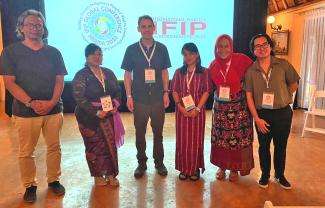From 21-24 February 2023, the International Funders for Indigenous Peoples (IFIP) Global Conference was held in Merida, Yucatan, Mexico. The theme of this year’s event was ‘Shifting Power: Indigenous Peoples’ Rights, Leadership and Self-determination’.
Under this banner, the event set out to address three key issues: shifting power and resources to Indigenous Peoples; ensuring their rights to self-determination, sharing and learning at ground level; and the role of intergenerational Indigenous leadership in promoting, protecting and revitalising Indigenous knowledge.
The Global Conference set out to create a platform where funders and Indigenous partners could meet, collaborate and develop the next stages in their plans, such as increasing the scope of Indigenous philanthropy and gaining direct access to funds.
In practice, this involves appraisals of donor methods and tactics. In some cases, practices were fine tuned to align more closely with the 5Rs of Indigenous philanthropy: Respect, Relationships, Responsibility, Reciprocity and Redistribution.
In conversation with Indigenous Peoples and international funders
Samdhana participated in two sessions in this year's IFIP Global Conference. The first was entitled ‘Out Colonial Systems, In Indigenous Governance: How Small Southern Grant-makers are Shifting Power’ and was hosted by the Global Greengrants Fund.
One of the panellists was Samdhana Grant Coordinator Patti Rahmi Rahayu, who outlined various practices and related success stories from 20 years of Samdhana’s experience supporting IPLCs. She also discussed support for IP rights and recognition, along with methods for strengthening Indigenous knowledge, systems, practices and livelihoods in Indonesia, the Philippines and Mekong countries.
During the event, Samdhana representatives and partners shared their experience of administering the Dedicated Grant Mechanism Indonesia (DGM-I, 2016-2022). The DGM-I provides evidence that Indigenous Peoples have the capacity to afford substantial funding and manage their projects effectively, given the right capacity development support.
This session also featured Pratima Gurung and Ipul Vicky Powasu, who are IP representatives from Nepal and Papua New Guinea, respectively. They exchanged views on funding for IPs with Artemisa Castro Felix, the Executive Director of Fondo Acción Solidaria (FASOL). Overall, the discussion highlighted respect for IP rights, knowledge, systems and practices; and emphasised the importance of building trust in relationships between IPs and supporting organisations so the latter can achieve their goals.
Intergenerational learning and leadership
The second session was dubbed ‘Listening to Stories Past for the Future: Nurturing Indigenous Peoples’ Intergenerational Spirit to Protect the Earth’, which Samdhana facilitated. The panellists from Southeast Asia were Michelin Sallata, Chairperson of the Barisan Pemuda Adat Nusantara (BPAN) in Indonesia; Catherine Dalon, from the Save Our Schools (SOS) Network in the Philippines, who joined via Zoom; and Naw Ei Ei Min, Director of Promotion of Indigenous and Nature Together (POINT), from Myanmar.
Naw Ei Ei Min emphasised the importance of intergenerational learning and leadership, along with the challenges POINT has identified in local communities. She also reiterated the value of IPs’ knowledge and skills, as they foster local and global linkages and maximise their engagement across various different groups, including youth, women, persons with disabilities (PWDs), elders, leaders, religious sectors, cultural and literature groups, etc.
Michelin Sallata highlighted the Homecoming Movement she and her group have initiated in Indonesia. It encourages Indigenous youth to return to their villages, so they can continue to protect their customary territories. This offers a number of benefits, such as learning from traditional elders, developing farming and cultivation of plants that are central to traditional foods, and patrolling Indigenous territories. The movement advocates recognition of traditional lands, by helping members use mobile phones to produce video campaigns.
Catherine Dallon illuminated the ongoing violation of children’s right to education in the Philippines, particularly those struggling against militarisation in Indigenous territories. The Youth Manifesto called out the lack of accessibility to culturally appropriate education for Indigenous children, and the need to strengthen their cultural identity, revive their languages, and increase youth leadership. The key takeaway was that young IPs value access to land, and dream of a future in which they no longer have to worry about defending it
To provide attendees with practical experience of these issues at the ground level, IFIP 2023 also featured a series of experiential learning sessions. These sessions took place in various locations and were focused on four main themes: Indigenous women’s leadership, youth leadership and transformation, and Indigenous entrepreneurship. You can find more information about IFIP 2023 here.




